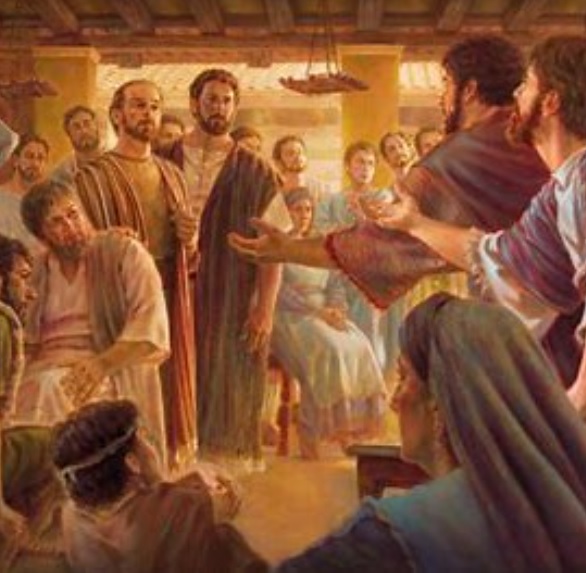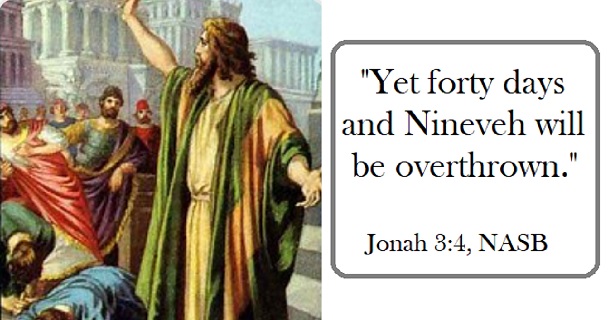“Go therefore and make disciples of all the nations…teaching them to observe all that I commanded you; and lo, I am with you always, even to the end of the age” (Matthew 28:19-20, NASB).
——————–
Contents:
1) “Garage-Sale Christianity” (Jim Lee)
2) Faith, Yes, But Not By Faith Alone (Bill Crews)
3) The Qualities of 1 Peter 3:8 (video sermon, Tom Edwards)
4) News & Notes
——————–

-1-
“Garage-Sale Christianity”
Jim Lee
Springtime is just around the corner, and many of us are eagerly anticipating its arrival. The springtime offers much for us to do. Depending on where we live, during the winter, many of us are restricted from activities, i.e., planting flowers, cutting grass, etc., we enjoy during the warmer months. (In fact, as I write this article, it’s snowing here in southern Ohio).
But another springtime event to which many of us look forward is the garage sale, and the excitement of going. Isn’t it amazing what good deals we can find at garage sales? For the most part, folks wish to clear out and be rid of things for which they no longer have use. In fact, some things, which at one time cost a good amount of money, are now being sold for pocket change.
I was just thinking about the resemblance between some Christians and garage-sale items. Here’s a person whose sins “the Lamb of God” has taken away (John 1:29); whose soul the Son of God has purchased (1 Corinthians 6:20); whose name is written in the “Lamb’s book of life” (Philippians 4:3). Yet, because he has no “root system,” he falls away into temptation’s snare (Luke 8:13), and he treats his soul as though it is nothing more than a “garage-sale item.”
Do you know any folks like that? Who, at the “drop of a hat,” are willing to give up on everything that God has provided for them. Why can’t these folks see the big picture? Have they forgotten what Jesus said in Matthew 16:24-26? Brothers and sisters, has the soul’s value been reduced to pocket change? Has Christ’s blood become something to “trample underfoot,” and has it become an “unholy thing” (Hebrews 10:29).
Brethren, it is absolutely essential that we stress to those we teach, and ensure that they understand, the cost involved in following our Savior. And we would do well to remind those, even among our immediate families, of the price paid for our spiritual freedom (John 3:16; 8:32). There is a real purpose for saying what I’ve just said. Within the past year, I have personally witnessed the destruction of three “Christian homes,” due to sexual immorality (John 10:10).
These were homes where the husbands and wives were in their early-to-mid 30s; husbands and wives who, as children, were raised and trained to become Christians. The husbands in two of the homes have fathers who are gospel preachers. Thus, brethren, we see the need to re-emphasize the costs involved with following Jesus. Jesus, Himself, made this point clear on more than one occasion (Luke 9:57-62; 14:26-35).
My brethren, of a truth, we are at war! Ephesians 6:10-18, as is all scripture, is there for a purpose. The Holy Spirit knew of the coming conflicts that God’s children would have to encounter; thus, He stressed the need to obey the “Captain of our salvation” (Hebrews 2:10). The devil has already taken too many “POWs,” due to their lack of loyalty and commitment; and sadly, a large number of those who once were soldiers of Christ are now “MIA!” Where do you find yourself spiritually? Are you working, laboring for the Master, bringing in the sheaves, or do you stand idle all the day long (Matthew 20:6).
Again, I would urge us all to “count the cost.” We all sing: “What can wash away my sins, nothing but the blood of Jesus.” He shed His blood and died for your sins and mine (Romans 5:8); and in return, He asks nothing but that we live for Him daily (1 Corinthians 15:58).
So when spring arrives, and you begin going to garage sales, looking at price tags, and thinking what a great deal you’re making, don’t forget about the price tag for your soul! For how little are you willing to “sell it.”
— Via Articles from the Knollwood church of Christ, April 2003
——————–

-2-
Faith, Yes, But Not By Faith Alone
Bill Crews
The religious conceptions and convictions of most people are formed more by their own environment — their upbringing and their surroundings — than by any personal study of the Bible. Such influence is usually a powerful teacher — whether in the right direction or in the wrong. Even what most people think (in their own minds, they can be “so sure”) the Bible teaches comes more from what their parents said to them, from what they heard various preachers say, from what friends and others have said, from what they gleaned from newspapers, magazines, books, movies, TV programs, than from their own reading of the Bible.
The most wide-spread and popular religious conclusion that people entertain is the idea that the Bible teaches that men are saved or justified by “faith only.” It may be expressed in many different ways — “only believe,” “all you need is faith,” ‘”just receive Jesus in your heart as your personal Savior,” “faith alone is God’s plan,” “all you have to do is to accept Christ” — but it still comes out the same, that is, that a sinner is saved solely, only, wholly, entirely by his faith in Christ, and, therefore, no other condition must be met or commandment must be obeyed to receive salvation.
Reader friend, did you know that the Bible does not teach this at all? Surely it teaches that men are saved, justified, purified, made righteous by faith (John 8:24; Romans 5:1-2; Ephesians 2:8-9; Acts 15:9; Mark 16:15-16; Galatians 3:23- 27; Romans 3:21-28), but it nowhere teaches that such a blessing comes by “faith only.” James 2:24 (read verses 14-26) plainly states that we are not justified by faith only, and other passages clearly teach that other conditions are required (Acts 3:19 — “be converted” or “turn again”; Acts 17:30 — repent; Romans 10:9-10 — confess Jesus as Lord; Acts 2:38 — repent and be baptized; etc).
The great and courageous Martin Luther (of the 16th century), in his 1518 German translation of the New Testament, was so convinced that salvation was by faith only that he added the word “only” (the German word “solo”) to Romans 3:28 to get salvation by “faith only” into the Bible. Disgusted by his own church’s (Roman Catholic) doctrine and practice of salvation by works of merit, he went to the opposite extreme of denying the necessity of any works at all. At the time he had decided that James (because of James 2:14-26) did not even belong in the Bible because it contradicted what he honestly thought Paul taught in Romans 4. What Luther failed to see is this: Every passage that he regarded as teaching that salvation is not by works of any sort is a passage teaching that men are not justified by the works of the Law of Moses or any such law (this would be works of merit and, therefore merited salvation). These passages were designed to answer the “Judaizers” who were binding the law of Moses and the old covenant of fleshly circumcision on the disciples of Christ, Jews and Gentiles (read Acts 15:1, 5; Galatians 2:3-5, 11-16; 5:2-8 for information on this). Romans 3 and 4 and Galatians 2 and 3 deal with this problem of the Judaizers, but so many today, like Luther, think that they were written to deny the necessity of any works and to lead us to conclude that salvation is by faith only.
But Martin Luther was by no means the last to add the word “only” or “alone” to Bible passages teaching the great doctrine of salvation by faith (a faith that works, an obedient faith). The widely distributed Good New For Modern Man, the New Testament in Today’s English Version (TEV), sponsored and promoted by the American Bible Society, does it in Romans 1:17; 3:28 and Galatians 2:16. The more popular Living Bible Paraphrased (not a translation, but only a paraphrase), which takes great liberties on many matters, adds the word “only” in Romans 4:9, 12 (also compare John 1:12; Romans 1:17 and 3:21-22). Newer versions and paraphrases have taken even more liberties.
To say that man cannot be justified by the works of the Law of Moses (Galatians 2:16), to say that man cannot be justified by any works of merit or by his own righteousness (Titus 3:5; Ephesians 2:8-9) is not to say that man is justified by faith alone. “For in Christ Jesus neither circumcision availeth anything. nor uncircumcision; but faith working through love” (Galatians 5:6) “You see that by works a man is justified, and not by faith only” (James 2:24).
— Via Roanridge Reader, Volume 30, Issue 29, Page 02, July 18, 2021
——————–
-3-
The Qualities of 1 Peter 3:8
Tom Edwards
To play the video sermon with the above title, just click on the following link while on the Internet:
https://thomastedwards.com/wordpress/1_Peter_3_8.mp4
——————–
-4-
News & Notes
Tori McCarthy had not been feeling well for a few days last week, but began feeling better yesterday. She was tested for the coronavirus earlier in the week and the results came back negative. She also mentioned that everyone from the party eight days ago that had also been tested had results that came back negative. But she does request prayer that everyone will stay well. The woman who had been at the party with COVID-19, but did not know until later, is now doing better.
Rex Hadley is now back home from rehab and will continue with that at home.
Also to keep in prayer: Rick Cuthbertson, Jeff Nuss, Michael Rittenhouse, Nell Teague, Andrew Wright, and Deborah Medlock
Let us also continue to remember our shut-ins.
Next Sunday (August 1), we will resume our 9 a.m. Bible class. Danny Bartlett will be teaching on the book of Ephesians.
We will also have a “song service” next Sunday at 5 p.m. , and will continue with that on the first Sunday of every month.
——————–
The Steps That Lead to Eternal Salvation
1) Hear the gospel — for that is how faith comes (Rom. 10:17; John 20:30-31).
2) Believe in the deity of Jesus Christ (John 8:24; John 3:18).
3) Repent of sins. For every accountable person has sinned (Romans 3:23; Romans 3:10), which causes one to be spiritually dead (Ephesians 2:1) and separated from God (Isaiah 59:1-2; Romans 6:23). Therefore, repentance of sin is necessary (Luke 13:5; Acts 17:30). For whether the sin seems great or small, there will still be the same penalty for either (Matt. 12:36-37; 2 Cor. 5:10) — and even for a lie (Rev. 21:8).
4) Confess faith in Christ (Rom. 10:9-10; Acts 8:36-38).
5) Be baptized in water for the remission of sins (Mark 16:16; Acts 2:38; 22:16; 1 Pet. 3:21). This is the final step that puts one into Christ (Gal. 3:26-27). For from that baptism, one is then raised as a new creature (2 Cor. 5:17), having all sins forgiven and beginning a new life as a Christian (Rom. 6:3-4). For the one being baptized does so “through faith in the working of God” (Col. 2:12). In other words, believing that God will keep His word and forgive after one submits to these necessary steps. And now as a Christian, we then need to…
6) Continue in the faith by living for the Lord; for, if not, salvation can be lost (Matt. 24:13; Heb. 10:36-39; Rev. 2:10; 2 Pet. 2:20-22).
——————–
Tebeau Street
CHURCH OF CHRIST
1402 Tebeau Street, Waycross, GA 31501
We are currently meeting for only our Sunday 10 a.m. worship service each week, due to the coronavirus situation .
evangelist/editor: Tom Edwards (912) 281-9917
Tom@ThomasTEdwards.com
https://thomastedwards.com/go/all.htm/ (This is a link to the older version of the Gospel Observer website, but with bulletins going back to March 4, 1990.)








